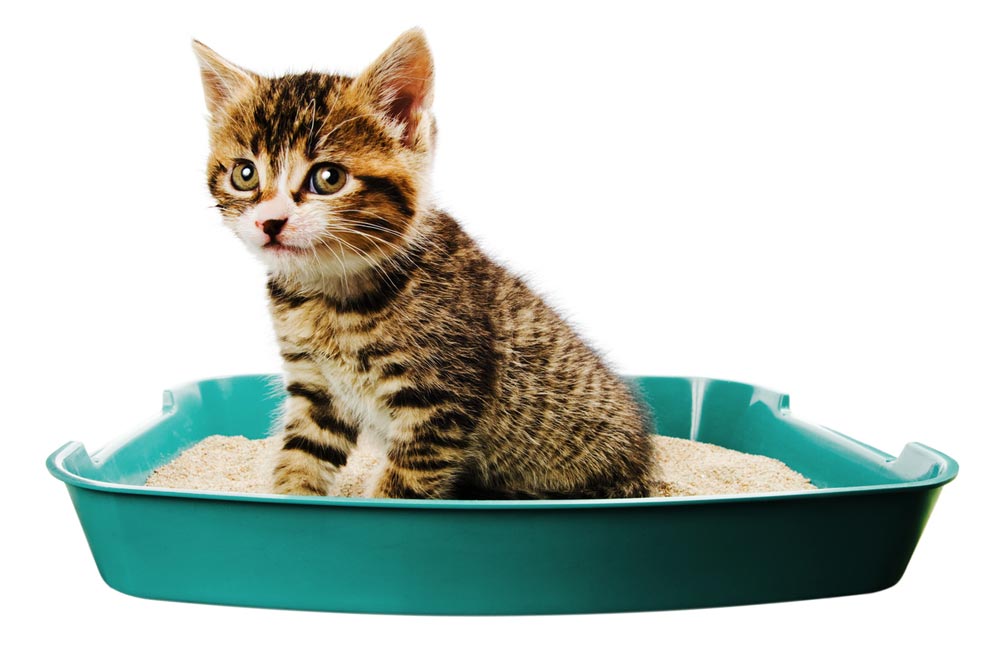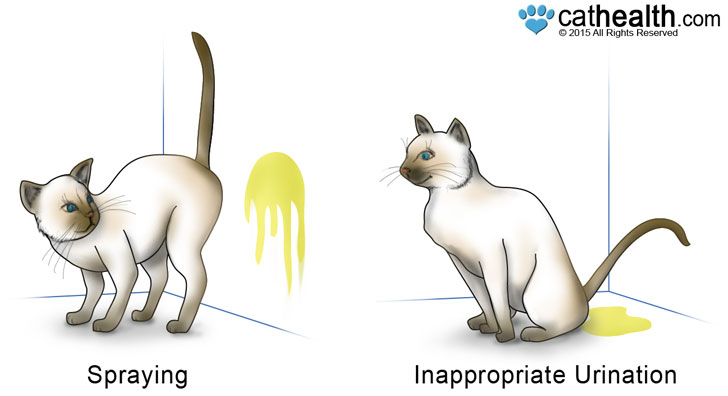Cat Not Using Litter Box? Inappropriate Urination in Cats

Inappropriate urination is the most common behavioral problem reported by cat owners. It is a leading cause of cats being abandoned outdoors, left at shelters, and euthanized. There is no doubt that it is extremely frustrating to have a cat that is urinating on your carpeting, bedding, or clothing. Most cases of inappropriate elimination can be resolved, but it may take some detective work and adjustments to your household to achieve it.
Why Do Cats Use Litter Boxes?
Many of us assume that cats use litter boxes instinctively. Actually, their impulse is to eliminate in soft soil or sand. The box is a convenience for humans, and it's really rather amazing that cats are so accommodating about it. Understanding this point will be a great help to both you and your cat. Elimination is a basic necessity, but in cat terms this function has an additional meaning. Cats sometimes use elimination as a communication tool to help establish their territory. So if your cat is not using the litter box, he may be trying to communicate something.
What is Inappropriate Urination in Cats?
It is important to differentiate between the two types of urinating outside of the litter box: spraying and inappropriate urination.

Spraying is performed by the cat standing and spraying a stream of urine on a vertical surface such as a wall, window, furniture, drapes, etc.
- This is a normal behavior for cats, and it serves to mark their territory.
- Both male and female cats spray, but it is most common in unneutered male cats. Neutering that is performed prior to six months of age will eliminate the vast majority of spraying behavior.
You can learn more about feline marking behaviors in this article.
Inappropriate urination is when a cat urinates in the normal squatting position, but not in the litter box.
Causes of Inappropriate Urination in Cats
- Medical problems: Urinary tract infections, diabetes mellitus, kidney disease, arthritis, and other medical problems are all common reasons for cats to urinate outside of their litter box.
-
Litter box aversions: Cats can develop an aversion to the litter box for any of a number of reasons. These generally fall into the following categories:
- Negative experiences in the litter box
- Box location aversions
- Substrate (litter type) aversions or preferences
Medical Problems
The first thing to do if you have a cat that is urinating outside of the litter box is to take him to the veterinarian. A urinalysis and possibly blood work can help to determine if there is an underlying medical condition contributing to the problem. If a medical cause is not found, it is time to do some detective work. It's important to understand the non-medical reasons that cats eliminate outside of the litter box in order to determine why yours could be doing it.
Negative Experiences in the Litter Box
Your cat may develop an aversion to litter boxes in general under some of the following circumstances:
-
Your cat has been harassed in some way while using the litter box.
- Children sometimes like to stalk cats and can often only catch them while they are in the litter box.
- A dominant cat may ambush a meeker cat while he is in the vulnerable position of using the box.
- Cat-owners sometimes capture cats in the litter box in order to administer unpleasant medication.
- Cats that have been caught in the act of urinating somewhere inappropriate, punished, and then shoved into their litter box will most likely experience a reinforced aversion to it.
- Dogs in the household may like to stalk cats when they are in the litter box. This may be because it is the only time they can catch them, or they may be hoping to be rewarded with some cat feces. Some dogs seem to love eating cat stool.
-
Cats do not want to use a dirty litter box.
- Cats are generally pretty fanatic about being clean. They don't like to walk into a litter box and get urine or feces on their paws. This is an even more unpleasant experience for them than it is for us when we walk into a smelly, dirty port-a-potty. Cats will often seek another, cleaner spot to eliminate if the box is consistently too dirty.
- Cats are very sensitive to the smells of other cats and will sometimes avoid the waste of an ill housemate. If one cat is sick or on medications that change the odor of their excrement, the other cats may avoid the litter box.
-
Cats will often associate any pain or discomfort that they are having with the environment at that moment, and this can create a litter box aversion.
- Cats that have suffered from urinary tract infections, cystitis, or a blocked urethra have experienced pain when they try to urinate.
- Cats that have had gastrointestinal problems accompanied by painful defecation (constipation, gas, or diarrhea) may associate those feelings with the litter box. Even the experience of having diarrhea, then getting it on his paws when he tries to cover it could upset your cat.
- Cats that have experienced anal sac impaction and subsequently felt pain during defecation may develop an aversion to the litter box.
- Some owners have noticed a litter box aversion after they have added baking soda to the box in order to reduce odors. When urine hits the baking soda, it fizzes, and that may scare your cat.
- Cats may develop a litter box aversion after a declaw surgery or other paw or nail injury. The litter may irritate painful paws wounds even more, or the act of digging in the box could cause extra soreness. They could associate that added discomfort with the box.
Box Location Aversion
Location aversion means that your cat does not like the place that you chose to put his litter box. It's important to provide your cat with a place to eliminate where he feels safe and comfortable. The most common problems with litter box locations are as follows:
-
The box is located near loud or startling objects such as washing machines, dryers, televisions, stereos, or anything with a timer that may go off when the cat is using the box.
- Cats don't like to be startled. If your cat has experienced a loud eruption of noise while he was using the litter box, he may be afraid to use it again.
-
The box is near the cat's food and water.
- Cats intuitively know that it's not good to eliminate near their food and water source. If the litter box is too close to these (or to your cat's bed), he may instinctively choose a spot that's further away.
-
The box is in a location that has too much traffic.
- Cats prefer privacy when they are using a litter box. People and cats have a lot in common in that area.
-
There is no escape route.
- Cats always want to know that they can escape a situation if necessary. A litter box that is placed in an area where your cat may be cornered by another cat, a dog, a child, or a human will likely be one that he hates to use.
Read about tips for good litter box placement here.
Box Type Preferences
Many cats have a kitty wish list regarding the litter box itself. Following are the most common box preferences for cats:
-
Many cats do not like covered litter boxes, though they are preferred by a few cats because they provide increased privacy.
- The cover can prevent cats from being able to scratch around in the litter or get into a comfortable position for eliminating.
- Humans like covered boxes because less odor escapes into the home, but that means that the smell is more concentrated inside the box. Cats are very sensitive to smells, and the ammonia concentration in the urine can even bother their eyes when it builds up inside of a covered box.
- If you do use a covered box, even more frequent scooping and cleaning than usual is required (see cleaning tips below). For a covered box with less cleaning requirements, consider a self-cleaning litter box.
-
Provide large, shallow litter boxes.
- The larger the box, the better. The box should be at least 24 inches long or wide. Cats like to be able to scratch around in the litter, move this way and that, and get in just the right position to comfortably eliminate. If the box is too small, your cat may develop an aversion to it or constantly miss and urinate over the edge.
- Cats like shallow boxes so they can get in and out of them easily. This becomes even more important as your cat ages and may develop sore joints that make it harder to jump into boxes with high sides. Since a box with low sides may allow litter to fly out all over when your cat covers his excrement, an alternative is to use a covered box without the lid or a plastic storage tub with an entryway cut into the side. This will provide higher sides for containing litter but easy entrance for your cat.
- Under-the-bed sweater boxes
make great litter boxes. They are large, shallow, and you can place the lid underneath of the box to help catch stray litter.
-
Many cats do not like plastic tray liners.
- Cats' nails get caught in the plastic liner, they may dislike its texture, and the noise it makes when they scratch at it may be displeasing to them.
Litter (Substrate) Aversions
- A number of different litters are available, but most cats prefer the scoop-able clumping litters. They are soft and sand-like and are considered a perfect elimination substrate for most cats. Plain sand is also loved by most cats.
- Crystal litters are another option. These absorb urine and its odor completely but still need to be scooped daily. Most cats will only urinate in crystals, so another box with a different type of litter should be provided for defecation.
- Many cats dislike deodorant litters because the smell is too powerful for them.
- Strong-smelling cedar or pine chip litters are often disliked and avoided by cats.
- Cats with long, fine hair (such as Persians) seem to be more particular to substrate preferences than other cats.
Read tips for avoiding litter type aversion here.
Read tips for good litter box cleaning here.
How Can You Tell If Your Cat Is Developing a Litter Box Aversion?
It is important to deal with inappropriate urination problems immediately. The longer the behavior persists, the more difficult it is to change. It is even more helpful if you can spot the problem coming before it actually begins and take steps to deter it.
You may be able to catch your cat's litter box aversion while it is developing if you notice any of the following signs:
- Your cat eliminates just outside of the litter box.
- Your cat hesitates quite a bit before entering his box and tries not to move around too much once he is in it.
- Your cat scratches the area outside of the box but does not scratch at the litter once he is inside. Note: your cat may scratch both outside and inside of the box normally, but he should not only scratch outside of it.
- Your cat perches precariously on the edge of the box, appearing as though he doesn't want to touch anything inside of it.
- Your cat leaps out of the box as soon as he is finished. He may even run away from the box like something is chasing him.
NOTE: It is not uncommon for cats to leave their urine and feces uncovered. In the wild, many cats do this to mark their territory. On its own, leaving litter box contents uncovered is not a sign that your cat is developing a litter box aversion.
If the above tips don't work for your cat or you need more ideas, take a look at this article: General Tips for Solving Inappropriate Urination Problems in Cats
Inappropriate urination in cats is a frustrating problem. Understanding your cat's behavior, then using a systematic approach to changing it can have you living in harmony with your feline friend again.
You May Also Like These Articles:
Litter Box Location Preference
Substrate Aversions and Preferences
How to Detect and Clean Urine Stains
Notice: Ask-a-Vet is an affiliated service for those who wish to speak with a veterinary professional about their pet's specific condition. Initially, a bot will ask questions to determine the general nature of your concern. Then, you will be transferred to a human. There is a charge for the service if you choose to connect to a veterinarian. Ask-a-Vet is not manned by the staff or owners of CatHealth.com, and the advice given should not delay or replace a visit to your veterinarian.





